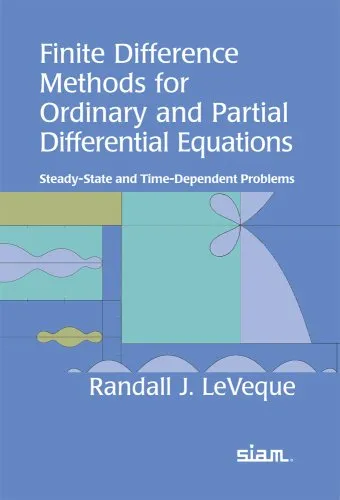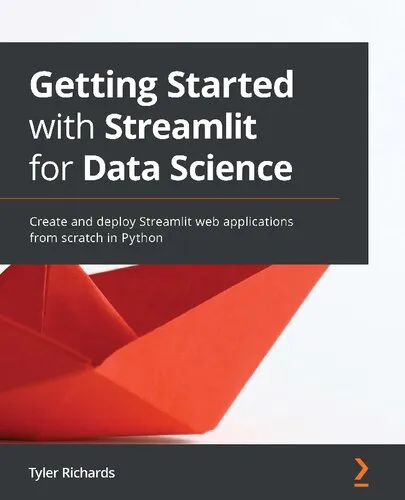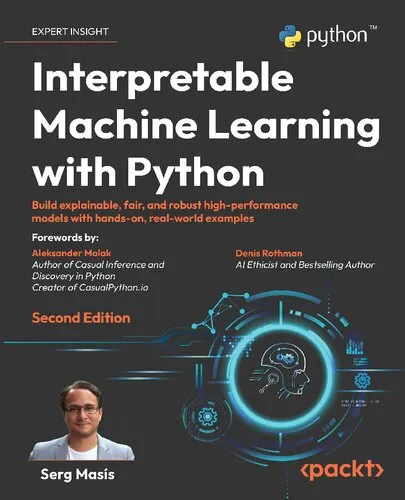Finite Difference Methods for Ordinary and Partial Differential Equations: Steady-State and Time-Dependent Problems (Classics in Applied Mathematics)
4.7
بر اساس نظر کاربران

شما میتونید سوالاتتون در باره کتاب رو از هوش مصنوعیش بعد از ورود بپرسید
هر دانلود یا پرسش از هوش مصنوعی 2 امتیاز لازم دارد، برای بدست آوردن امتیاز رایگان، به صفحه ی راهنمای امتیازات سر بزنید و یک سری کار ارزشمند انجام بدینکتاب های مرتبط:
معرفی جامع کتاب "Finite Difference Methods for Ordinary and Partial Differential Equations"
کتاب Finite Difference Methods for Ordinary and Partial Differential Equations: Steady-State and Time-Dependent Problems یکی از آثار برجسته در زمینه روشهای عددی برای حل معادلات دیفرانسیل است. این کتاب توسط Randall LeVeque نوشته شده و به دلیل جامعیت و ساختار آموزشی منظم خود، به یکی از کلاسیکهای ریاضیات کاربردی تبدیل شده است. در این اثر، مفاهیم به طور دقیق پوشش داده شده و همراه با مثالهای مفهومی و کاربردی عمیق، مقدمهای جامع بر روشهای Finite Difference ارائه میشود.
خلاصهای جامع از کتاب
این کتاب به بررسی روشهای Finite Difference برای حل معادلات دیفرانسیل عادی (ODEs) و معادلات دیفرانسیل با مشتقات جزئی (PDEs) میپردازد. مباحث آن به دو بخش کلی معادلات پایدار (Steady-State) و معادلات وابسته به زمان (Time-Dependent Problems) تقسیم میشود. در کتاب، ابتدا اصول اولیه Finite Difference Method توضیح داده میشود، سپس به تحلیل خطا، عملکرد، و پایداری روشها پرداخته شده است. از جمله موضوعات مهم میتوان به روشهای یکبعدی و دوبعدی، روشهای تلخیص مرتبه بالا، و تکنیکهای پیشرفتهتر اشاره کرد.
Randall LeVeque در این اثر تلاش کرده است تا تمامی مفروضات و مفاهیم به شکلی روشن برای خوانندگان توضیح داده شود تا دانشجویان، مهندسان، و محققان بتوانند معادلات دیفرانسیل پیچیده را به روش عددی حل کنند. علاوه بر پوشش مسائل کلاسیک، این کتاب کاربردهای مدرن روش Finite Difference در تحلیل مسائل فیزیکی و مهندسی را نیز بررسی میکند.
نکات کلیدی که از کتاب میآموزید
- فهم دقیق از تئوری و کاربرد روش Finite Difference برای ODEs و PDEs.
- آشنایی با تحلیل پایداری و خطای روشهای Finite Difference.
- یادگیری روشهای مرزی (Boundary Conditions) و پیادهسازی آنها.
- درک مسائل رایج در تحلیل عددی و تکنیکهای پیشرفته حل آنها.
- استفاده از این روشها برای مدلسازی فرآیندهای فیزیکی نظیر انتقال حرارت و مسائل دینامیکی.
نقل قولهای معروف از کتاب
"The finite difference method provides a powerful and flexible framework for solving differential equations numerically, but its effectiveness depends crucially on proper design of the discretization."
"Understanding stability is the key to constructing robust numerical methods."
چرا این کتاب اهمیت دارد؟
این کتاب نقطه عطفی در آموزش و یادگیری روشهای عددی است. بسیاری از کتابهای موجود در این زمینه یا بیش از حد پیچیده هستند یا به اندازه کافی کاربردی و عملیاتی نیستند. Randall LeVeque با ساختاری آموزشمحور، کتابی خلق کرده که به خوانندگان این اجازه را میدهد تا مفاهیم را عمیقاً درک کنند و در پروژههای عملی از آن بهره ببرند. این کتاب برای دانشجویان و مهندسانی که در رشتههای علوم محاسباتی، فیزیک کاربردی، مهندسی مکانیک و علوم ریاضی فعالیت دارند، یک منبع ضروری به شمار میرود.
علاوه بر این، این کتاب مفاهیمی را ارائه میدهد که مستقیماً در زمینههای مختلفی از جمله مدلسازی فلوئیدها، انتقال حرارت، و الکترومغناطیس کاربرد دارد. ساختار گامبهگام کتاب به خوانندگان امکان میدهد حتی مسائل پیچیده معادلات دیفرانسیل را با اعتماد به نفس حل کنند.
Introduction to "Finite Difference Methods for Ordinary and Partial Differential Equations: Steady-State and Time-Dependent Problems"
"Finite Difference Methods for Ordinary and Partial Differential Equations" by Randall J. LeVeque is a cornerstone in the fields of numerical analysis and computational mathematics. Recognized as part of the prestigious "Classics in Applied Mathematics" series, this book provides an in-depth foundation for understanding and solving differential equations using finite difference methods. It is an invaluable resource for researchers, professionals, and students alike who wish to delve into the mathematical algorithms that underpin much of modern science and engineering.
Addressing both steady-state and time-dependent problems, this book serves as a practical guide to developing reliable and efficient algorithms for differential equations. It focuses on iterative and numerical techniques that are essential for simulating complex physical processes, including fluid dynamics, heat transfer, and wave propagation. Written in a clear and accessible style, the book balances theoretical rigor with practical examples, making it an evergreen reference across diverse domains.
Detailed Summary of the Book
The book begins with a foundational introduction to finite difference methods and gradually progresses into more advanced topics, ensuring that readers from varying levels of expertise can follow along. The content is split into manageable sections that detail the formulation, implementation, and analysis of finite difference schemes.
Core topics include:
- Formulation of finite difference approximations for ordinary and partial differential equations (ODEs and PDEs).
- Analysis of truncation errors, stability, and convergence – critical components of numerical methods.
- Application of explicit and implicit methods for solving time-dependent equations.
- Efficient solution strategies for steady-state problems.
- Introduction to iterative solvers and their role in computational simulation.
- Techniques for boundary conditions, grid generation, and adaptive mesh refinement.
Throughout the book, mathematical derivations are supported by computational perspectives, enabling readers to implement these methods in practical coding environments. The inclusion of illustrative examples and exercises further enhances the learning experience, providing hands-on opportunities to master the discussed techniques.
Key Takeaways
By reading this book, you will gain:
- A solid understanding of finite difference methods and their applications to solving ODEs and PDEs.
- Insights into the theoretical underpinnings of numerical stability and how it impacts computational error.
- The ability to analyze and implement numerical schemes for steady-state and dynamic systems.
- Exposure to advanced concepts such as numerical dispersion and artificial viscosity.
- Practical strategies for building robust algorithms that maintain accuracy across various problem domains.
Armed with these skills, you will be well-prepared to tackle cutting-edge challenges in applied mathematics, engineering, and other technical fields.
Famous Quotes from the Book
"Numerical stability is not just a desirable feature—it is an absolute necessity."
"Finite difference methods serve as both a scaffold for understanding and a tool for computation."
"The art of numerical analysis lies not just in solving problems but in understanding their behavior."
Why This Book Matters
This book stands out because it bridges the gap between theory and practice, making complex mathematical concepts approachable and practical. In an era where computational simulations drive innovation in science and engineering, a deep understanding of finite difference methods is more important than ever.
Randall LeVeque's meticulous exposition provides tools that are not only academically significant but also directly applicable to real-world problems. Whether you are modeling natural phenomena, designing engineering systems, or exploring mathematical theory, this book equips you with the expertise required to excel.
Furthermore, the book emphasizes critical thinking over rote computation, fostering a mindset that allows readers to adapt methods to new challenges as they arise. This adaptability makes the book a timeless resource and a must-read for anyone involved in computational mathematics.
دانلود رایگان مستقیم
شما میتونید سوالاتتون در باره کتاب رو از هوش مصنوعیش بعد از ورود بپرسید
دسترسی به کتابها از طریق پلتفرمهای قانونی و کتابخانههای عمومی نه تنها از حقوق نویسندگان و ناشران حمایت میکند، بلکه به پایداری فرهنگ کتابخوانی نیز کمک میرساند. پیش از دانلود، لحظهای به بررسی این گزینهها فکر کنید.
این کتاب رو در پلتفرم های دیگه ببینید
WorldCat به شما کمک میکنه تا کتاب ها رو در کتابخانه های سراسر دنیا پیدا کنید
امتیازها، نظرات تخصصی و صحبت ها درباره کتاب را در Goodreads ببینید
کتابهای کمیاب یا دست دوم را در AbeBooks پیدا کنید و بخرید
1198
بازدید4.7
امتیاز0
نظر98%
رضایتنظرات:
4.7
بر اساس 0 نظر کاربران
Questions & Answers
Ask questions about this book or help others by answering
No questions yet. Be the first to ask!






![The Ultimate iOS Interview Playbook: Conquer Swift, frameworks, design patterns, and app architecture [Team-IRA]](https://s3.refhub.ir/images/thumb/The_Ultimate_iOS_Interview_Playbook__Conquer__29925.webp)







